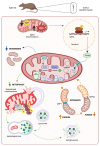Recovery of SIRT3-SOD2 Axis and Mitophagy by Short-Term Calorie Restriction in Old Rat Soleus Skeletal Muscle
- PMID: 41009029
- PMCID: PMC12466821
- DOI: 10.3390/antiox14091125
Recovery of SIRT3-SOD2 Axis and Mitophagy by Short-Term Calorie Restriction in Old Rat Soleus Skeletal Muscle
Abstract
Age-related mitochondrial dysfunction is involved in the progressive loss of mass and strength of skeletal muscle with aging. The effects of a short-term calorie restriction (ST-CR) were assessed in the oxidative skeletal soleus muscle (Sol) from 27-month-old rats and compared with those of a CR in combination with resveratrol (RSV) (ST-CR + RSV). PGC-1α and PRXIII proteins showed a marked decrease in both ST-CR and ST-CR + RSV rats. The SIRT3 protein presented a very relevant increase in both ST groups. ST-CR and ST-CR + RSV elicited a marked increase in SOD2 protein amount and activity. ST-CR and ST-CR + RSV led to recovery of the SIRT3-SOD2 axis as a fast/early response. ST-CR and ST-CR + RSV did not affect the MFN2 protein, whereas both treatments induced a relevant increase in DRP1 protein. ST-CR and ST-CR + RSV induced a decrease in Parkin protein, suggestive of rescued mitophagy, leading to the elimination of dysfunctional mitochondria. Such a response likely enhanced the fission-mediated elimination of mitochondria, supported by the marked increase in DRP1. MtDNA copy number and TFAM protein were not changed by any ST treatment. The mtDNA oxidative damage level was strongly increased by both ST treatments. All the effects elicited by ST-CR and ST-CR + RSV were specific to the oxidative type fibers.
Keywords: aging; caloric restriction; mitochondrial biogenesis; mitophagy; rat soleus skeletal muscle; resveratrol.
Conflict of interest statement
The authors declare no conflicts of interest.
Figures







References
Grants and funding
LinkOut - more resources
Full Text Sources
Miscellaneous

